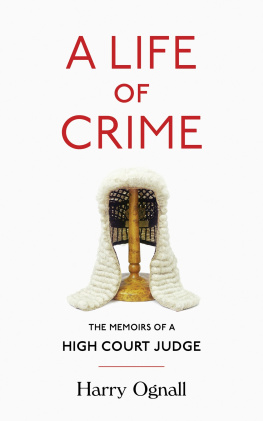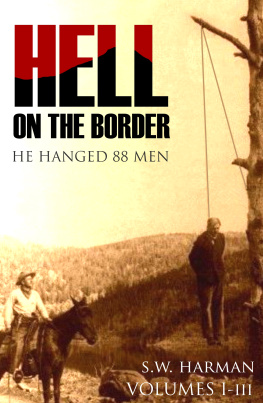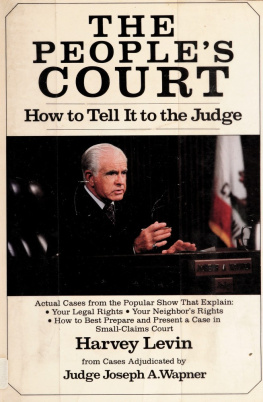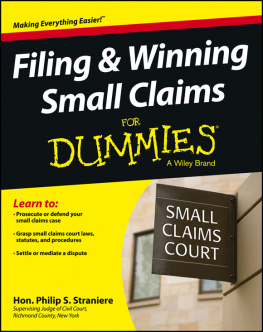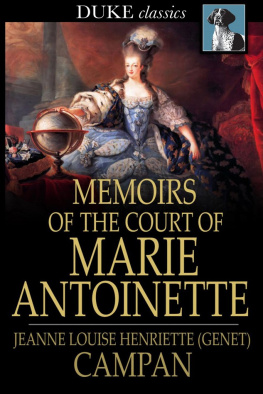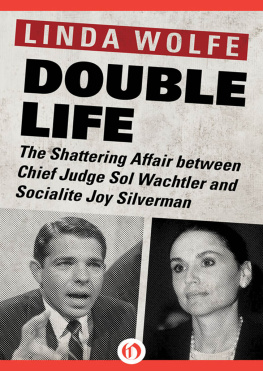Harry Ognall - A Life of Crime: The Memoirs of a High Court Judge
Here you can read online Harry Ognall - A Life of Crime: The Memoirs of a High Court Judge full text of the book (entire story) in english for free. Download pdf and epub, get meaning, cover and reviews about this ebook. year: 2018, publisher: William Collins, genre: Non-fiction / History. Description of the work, (preface) as well as reviews are available. Best literature library LitArk.com created for fans of good reading and offers a wide selection of genres:
Romance novel
Science fiction
Adventure
Detective
Science
History
Home and family
Prose
Art
Politics
Computer
Non-fiction
Religion
Business
Children
Humor
Choose a favorite category and find really read worthwhile books. Enjoy immersion in the world of imagination, feel the emotions of the characters or learn something new for yourself, make an fascinating discovery.
- Book:A Life of Crime: The Memoirs of a High Court Judge
- Author:
- Publisher:William Collins
- Genre:
- Year:2018
- Rating:4 / 5
- Favourites:Add to favourites
- Your mark:
- 80
- 1
- 2
- 3
- 4
- 5
A Life of Crime: The Memoirs of a High Court Judge: summary, description and annotation
We offer to read an annotation, description, summary or preface (depends on what the author of the book "A Life of Crime: The Memoirs of a High Court Judge" wrote himself). If you haven't found the necessary information about the book — write in the comments, we will try to find it.
A Life of Crime: The Memoirs of a High Court Judge — read online for free the complete book (whole text) full work
Below is the text of the book, divided by pages. System saving the place of the last page read, allows you to conveniently read the book "A Life of Crime: The Memoirs of a High Court Judge" online for free, without having to search again every time where you left off. Put a bookmark, and you can go to the page where you finished reading at any time.
Font size:
Interval:
Bookmark:
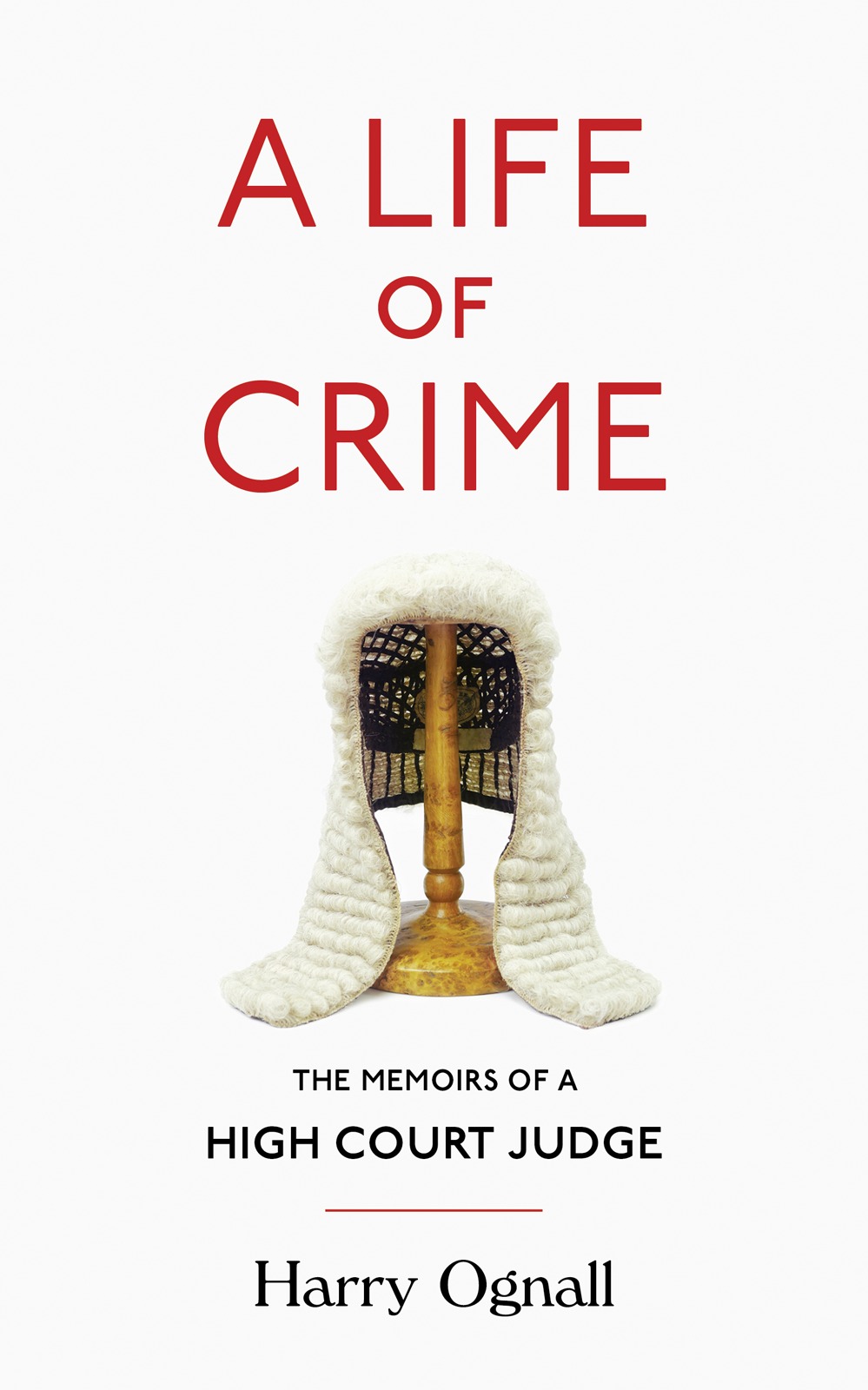
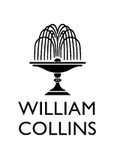

William Collins
An imprint of HarperCollins Publishers
1 London Bridge Street
London SE1 9GF
www.WilliamCollinsBooks.com
This eBook first published in Great Britain by William Collins in 2017
Copyright 2017 Harry Ognall
Cover photograph Annings Digital Photography, Ilkley
Harry Ognall asserts the moral right to be identified as the author of this work
A catalogue record for this book is available from the British Library
All rights reserved under International and Pan-American Copyright Conventions. By payment of the required fees, you have been granted the non-exclusive, non-transferable right to access and read the text of this e-book on-screen. No part of this text may be reproduced, transmitted, down-loaded, decompiled, reverse engineered, or stored in or introduced into any information storage and retrieval system, in any form or by any means, whether electronic or mechanical, now known or hereinafter invented, without the express written permission of HarperCollins
Source ISBN: 9780008267469
Ebook Edition November 2017 ISBN: 9780008267476
Version: 2017-10-03
To Sally, for so many reasons.
Thats it, then
There are worse prisons than words
Carlos Ruiz Zafn, The Shadow of the Wind
C hinese wisdom encourages us to take comfort that even a journey of a thousand miles begins with a single step. But what if the journey is not one that lies ahead, but one of retrospect? Does that need less resolve or more?
My life in the law was filled with so much that enjoyed a high profile at the time, and which has left a legacy of continuing interest, and sometimes fascination. That said, there is an obvious danger that, as a central actor in those dramas, my recall may now be corrupted by the erosion of the passing years. Or my account may be tainted by the temptations of egotism, or the lure of the apocryphal.
And so I have put off this moment for a very long time, until it has become very clear that I should either embark now, or never. I must do my best to tell it as it really was.
W hat follows will be the odyssey of my life at the English criminal Bar and as a Queens Bench judge, recounted through the prism of some of the more memorable trials in which I was involved. But every narrative must have a beginning, and my early years seem to me to be as logical a starting place as any. Wholly to ignore the first twenty-five years of my life seems to me, anyway, to leave a void. However accidental my ultimate choice of career may seem to have been, perhaps within my early years is to be found the seed bed out of which my future grew.
I was born in 1934 in Salford, Lancashire, of middle-class Jewish parents. They were never more than easy-going in their orthodoxy, and (save in my early days at school during the war) my religion never featured as a significant or oppressive aspect of my life. I was named (curiously) Harry Henry, after my paternal grandfather, who had died one month earlier. I know very little about him. He was by all accounts a kind, modest and hard-working man. He lived with his wife, Bessie, in Rutherglen, Glasgow, and was a councillor for the Gallowflat Ward in what was then the separate town of Rutherglen, serving for one year as its provost, or mayor. He made the improvement of educational facilities and standards his special interest. He ran a small business, selling smoking pipes and tobacco.
My father, Leo, was the oldest of my grandfathers three sons and a daughter. He was born in 1908 and left school at sixteen. Thereafter, he worked first in Glasgow and then in Manchester in a variety of generally mundane jobs until the outbreak of the Second World War. (For a short time he was a cub journalist for a national newspaper, and achieved temporary fame by riding pillion on the Wall of Death at a visiting circus.) He worked for some years for a very large mail-order company. That bred in him a deep-seated and lifelong aversion to working for anybody save himself. He was adamant that both my young brother, Michael, and I should become professional men. (Michael was to qualify as a doctor.)
At the outbreak of war in 1939, his extreme short sight meant he was excused military service. He spent the war years working as a supervisor at an ordnance factory near Leeds that produced military vehicles and ammunition.
Providentially, he found his true niche in life in his middle years. He had always been an avid reader of detective fiction. I can remember a monthly magazine devoted to the genre Black Mask , which was always in our house. With the end of the war, and with no obvious employment in prospect, he decided to give writing a go. It was a courageous decision. He had a wife and three children to support, and no guarantee of success, but against the odds, it worked. His first offering to Collins publishers was accepted. Thereafter, until his death in 1979 he wrote under two pseudonyms some four detective novels a year. The royalties, while never very substantial, more than kept the wolf from the door. Above all, it fulfilled his fierce wish for independence.
My fathers small stature may well account for the fact (which I only recognized after his death) that he never rid himself of deep feelings of inadequacy. Only when going through his effects did I gain true insight into his real self. Over the last ten years of his life he wrote and assembled a large collection of reflections on life entitled Thoughts while Thinking. To my distress, I realized from reading these that I had scarcely known my father at all. His musings are sometimes provocative, sometimes touching, often profoundly wise, and throughout suffused with melancholy. I read them with a growing sense of wonder, and with sadness. Among them, I found this written a few years before he died:
All my life I have been a failure. My one achievement is that I am now honest enough to admit it.
How often since I first read those words have I wished I could tell him how wrong he was.

My mother, Cecilia (Cissie to all her friends), was born in 1909 of Polish immigrant parents who at the turn of the century had fled the pogroms with their families, and later married in the UK. Like many other Jewish refugees, they settled in Leeds. (The city was then a centre for bespoke tailoring, and my grandfather Noah was a skilled tailor.) My maternal grandmother (another Bessie) never learned either to read or write in the English language. Noah could read sufficiently to master the race cards published in the newspapers. He was an avid gambler.
My mother was a physically attractive woman. She was denied any higher education, but was gifted with a considerable native intelligence, insight and a natural charm. Unlike my father, she enjoyed a wide circle of friends. From time to time she turned her hand to the writing of short stories, some of which were published in magazines such as
Font size:
Interval:
Bookmark:
Similar books «A Life of Crime: The Memoirs of a High Court Judge»
Look at similar books to A Life of Crime: The Memoirs of a High Court Judge. We have selected literature similar in name and meaning in the hope of providing readers with more options to find new, interesting, not yet read works.
Discussion, reviews of the book A Life of Crime: The Memoirs of a High Court Judge and just readers' own opinions. Leave your comments, write what you think about the work, its meaning or the main characters. Specify what exactly you liked and what you didn't like, and why you think so.

